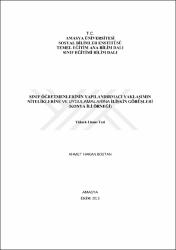| dc.contributor.advisor | Yapıcı, Şenay | |
| dc.contributor.author | Bostan, Ahmet Hakan | |
| dc.date.accessioned | 2022-03-09T14:56:07Z | |
| dc.date.available | 2022-03-09T14:56:07Z | |
| dc.date.issued | 2018 | |
| dc.identifier.uri | https://tez.yok.gov.tr/UlusalTezMerkezi/TezGoster?key=fS4sqEZr79C_n60Rk6MjFQzapz3Cr1Vf7NBwUaakmbPXkhxuQ5pkNytRBFF_Q56B | |
| dc.identifier.uri | https://hdl.handle.net/20.500.12450/1833 | |
| dc.description.abstract | Bu araştırmanın amacı, sınıf öğretmenlerinin yapılandırmacı yaklaşımın niteliklerine ve uygulamalarına ilişkin görüşlerini ve bu görüşlerin; cinsiyet, meslekteki hizmet süresi, sınıf mevcudu, mezun olunan okul türü, bu yıl okutulan sınıf ve yapılandırmacılık ile ilgili bilgi kaynağı değişkenleri açısından anlamlı bir farklılık gösterip göstermediğini belirlemektir. Bu araştırma, nicel tarama modelinde, betimsel bir araştırmadır. Araştırma için gerekli veriler, araştırmacı tarafından hazırlanan ölçek yoluyla elde edilmiştir. İstatistiksel işlemler sonunda ölçeğin, 7 faktörlü yapıda olduğu belirlenmiştir. Ölçme aracının güvenirliği bilişsel yapılandırmacılık ile ilgili düşünceler boyutunda .55, genel ve etkileşimci yapılandırmacılığa ilişkin düşünceler boyutunda .68, bilişsel düşünce eğitimi ile ilgili görüşler boyutunda .83, bilişsel kavram öğretimi ile ilgili görüşler boyutunda .81, okul dışı öğrenme ortamlarına ilişkin görüşler boyutunda .72, öğrenen merkezli genel yapılandırmacılığa ilişkin görüşler boyutunda .72 ve bilişsel yapılandırmacı öğretim süreciyle ile ilgili görüşler boyutunda .83 Cronbach alpa değeri bulunmuştur. Araştırmanın çalışma grubunu, Konya ili merkez ilçelerindeki ilkokullarda görev yapan 370 sınıf öğretmeni oluşturmuştur. İstatistiksel veri analizinde aritmetik ortalama, standart sapma, yüzde hesaplamaları, t testi, ANOVA ve Tukey HSD kullanılmıştır. Araştırma sonucunda, sınıf öğretmenlerinin yapılandırmacı yaklaşıma ilişkin görüşlerinde; cinsiyete, sınıf mevcuduna, eğitim düzeyine ve yapılandırmacılıkla ilgili bilgi kaynağına göre anlamlı bir farklılık olmadığı sonucuna ulaşılmıştır. Ancak, hizmet süresi, mezun olunan okul türü, okutulan sınıf düzeyine göre bilişsel yapılandırmacılığa, genel ve etkileşimci yapılandırmacılığa ilişkin düşünceler ile bilişsel düşünce eğitimine ve okul dışı öğrenme ortamlarına ilişkin görüşlerinde anlamlı farklılıklar bulunmuştur. Araştırmanın bulgularına göre, eğitim fakültesi mezunları, kendilerini genel ve etkileşimci yapılandırmacılığın esasları bakımından daha yeterli gördükleri sonucuna ulaşılmıştır. Eğitim fakültesi mezunu olmayan öğretmenlere hizmetiçi eğitim faaliyetlerinin düzenlenmesi önerilebilir. | en_US |
| dc.description.abstract | The purpose of this study was to examine the views of classroom teachers on constructivist approach and implementation of constructivist approach as well as examining their association with gender, duration of service in the profession, number of students in the class, type of school graduated, and grade level of classroom teacher's served. This research is a descriptive study in a quantitative survey model. Data collected using a scale developed by researcher for this study. Results of psychometric analyses suggested that seven factors for implementation of constructivist approach. Cronbach's alpha reliability of these factors were .55 for cognitive constructivism, .68 for general and interactivity constructivism, .83 for cognitive thought education, .81 in opinions on the teaching of cognitive concepts, .72 for non-school learning environments, .72 for opinions about learning-centered general constructivism, .83 for opinions about cognitive constructivist teaching process. Participants consisted of 370 classroom teachers working in the primary schools in Konya province. Data were analyzed using mean, standard deviation, percentages, independent samples t-test, and one way ANOVA, and Tukey HSD tests. As a result of the research, in the opinions of the class teachers about constructivist approach; gender, class presence, level of education and knowledge about constructivism. However, there were significant differences with respect to non-school learning environments, cognitive constructivism, general and interactivity constructivism, cognitive thought education. According to the findings of this survey teachers graduated from the faculties of educational sciences claim themselves more sufficient considering the fundamentals of general and interactive constructivism. It is suggested that on the job training activities should be regulated for the teachers not graduated from educational sciences faculties. | en_US |
| dc.language.iso | tur | en_US |
| dc.publisher | Amasya Üniversitesi | en_US |
| dc.rights | info:eu-repo/semantics/openAccess | en_US |
| dc.subject | Eğitim ve Öğretim | en_US |
| dc.subject | Education and Training | en_US |
| dc.subject | Sınıf öğretmenleri | en_US |
| dc.subject | Class teachers | en_US |
| dc.subject | Yapılandırmacı öğretim yöntemi | en_US |
| dc.subject | Constructivist teaching method | en_US |
| dc.subject | Öğretmen görüşleri | en_US |
| dc.subject | Teacher opinions | en_US |
| dc.subject | Öğretmenler | en_US |
| dc.subject | Teachers Onaylandı | en_US |
| dc.title | Sınıf öğretmenlerinin yapılandırmacı yaklaşımın niteliklerine ve uygulamalarına ilişkin görüşleri (Konya ili örneği) | en_US |
| dc.title.alternative | The views on qualifications and implementations constructor approach to classroom teachers (The case of Konya) | en_US |
| dc.type | masterThesis | en_US |
| dc.department | Enstitüler, Sosyal Bilimler Enstitüsü, Temel Eğitim Ana Bilim Dalı | en_US |
| dc.identifier.startpage | 1 | en_US |
| dc.identifier.endpage | 126 | en_US |
| dc.identifier.yoktezid | 529826 | en_US |
| dc.institutionauthor | Bostan, Ahmet Hakan | |


















